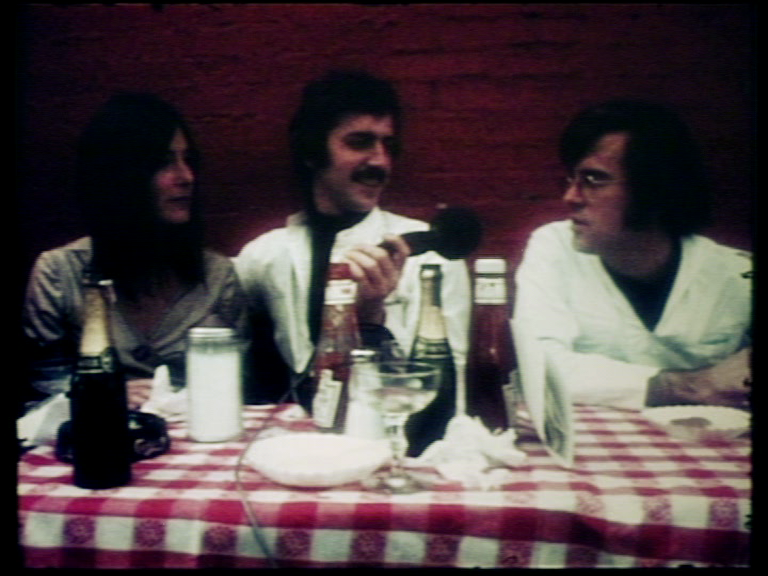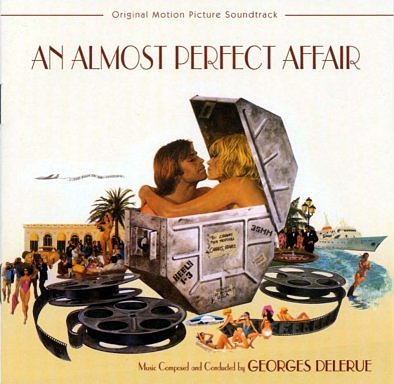Commissioned by the French film magazine Positif and published, as two separate but adjacent pieces (critical article and interview), in their 158th issue (avril 1974). I don’t recall it ever appearing before now in English, at least in its entirety. I’ve given it a light edit. The interview was conducted by correspondence, with me in France and McBride in the U.S.
Happily, all three of the McBride films discussed here are available on DVD — David Holzman’s Diary and My Girlfriend’s Wedding paired together in the U.K. (with liner notes by me, available here) and Glen and Randa in the U.S. — J.R.

Due to their limited visibility, the three films of Jim McBride have tended to lead semi-legendary existences. Like seeds scattered to the wind, they’ve cropped up in unexpected places: DAVID HOLZMAN’S DIARY (1967) has been shown at film festivals (it won prizes in Mannheim and Pesaro) and cine-clubs, but not in theaters; MY GIRLFRIEND’S WEDDING (1969), an hour-long film that is not easy to program, turned up on the Second Channel [in France] in a Sunday night “Cine-Club” (autumn 1972), but has rarely been seen elsewhere. GLEN AND RANDA (1971), seen much more widely in the United States — and even making Time magazine’s “Ten Best” list of that year — has been slow in reaching Europe, and surfaced in Pesaro only last September. Read more
From the July 1985 Video Times. — J.R.

An Almost Perfect Affair
(1979), C, Director: Michael Ritchie. With Keith Carradine, Monica Vitti, Raf Vallone, and Dick Anthony Williams. 93 min. PG. Paramount, $59.95. 1 1/2 stars
The seventh and possibly the slightest of Michael Ritchie’s features, An Almost Perfect Affair is a mild romantic comedy that qualifies as pseudosatire — that is, satire that couldn’t conceivably threaten or annoy anyone. Set at the Cannes Film Festival, and largely filmed on location there, the movie chronicles a brief affair between Maria (Monica Vitti) and Hal (Keith Carrdine). Maria is the glamorous wife of a wealthy Italian producer (Raf Vallone), who has a film in the competition. Hal is a callow American independent whose first feature is being shown at the festival. None of this is very believable to anyone who has ever attended the Cannes Festival professionally, but there’s little indication that it’s supposed to be. Much as Manhattan can be viewed in part as valentine to anti-intellectuals who want to feel intellectual, this movie, also made in 1979, is for people who will never go to Cannes but want to feel hip about what happens there.
Inverting the terms that such a comedy would have adopted in the countercultural 1960s, the movie presents the vulgar big-time producer as a man with patriarchal dignity. Read more
From Cineaste, Winter 1996 — J.R.

Even for longtime fans like myself of his independent features — Casual Relations (1973), Mozart in Love (1975), Local Color (1977), The Scenic Route (1978), Imposters (1979), Chain Letters (1984) — Mark Rappaport’s discovery of “fictional autobiography” has led to a quantum leap in his work whose consequences are still being mapped out. After already broaching some of the possibilities of video in his half-hour Postcards (1990) — succeeded most recently by his high-definition super-production Exterior Night (1994) made for German TV — Rappaport virtually invented a new form of film criticism in Rock Hudson’s Home Movies (1992), a melange of clips and commentary built around the premise of a finally out-of-the-closet Hudson (played by actor Eric Farr) reevaluating the subtexts of his films from beyond the grave. A video that won Rappaport more viewers than any of his previous features — especially after he transferred it to film and presented it at festivals — this revisionist take on film history has now been succeeded by From the Journals of Jean Seberg (1995), an even more ambitious and accomplished rereading of our movie past, with Mary Beth Hurt in the title role. After many festival screenings, the new film had its U.S. Read more



